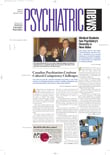High levels of the personality trait of neuroticism have been observed in patients with anxiety disorders, suggesting that the trait and such disorders might be related. In fact, the trait and generalized anxiety disorder could well be due to the same genes.
This hypothesis comes from a study headed by John Hettema, M.D., Ph.D., an assistant professor of psychiatry at Virginia Commonwealth University. A report of the results is published in the September American Journal of Psychiatry.
Generalized anxiety disorder is characterized by excessive, chronic worry regarding multiple areas of life and includes symptoms such as irritability, muscle tension, sleep disturbance, and difficulty concentrating.
To find out if generalized anxiety disorder and neuroticism are genetically related, Hettema and his colleagues conducted a large twin study.
They studied about 8,000 identical and fraternal twins, including twins of both genders. Subjects participated in either face-to-face or phone interviews to find out whether they had had generalized anxiety disorder at some point in their lives. The Structured Clinical Interview for DSM-III-R was used for this purpose. They were also assessed for neuroticism with the short form of the Eysenck Personality Questionnaire, which contains 12 items that overlap with some of the diagnostic criteria for generalized anxiety disorder such as irritability, nervousness, and excessive worrying.
The researchers then used the interview results to determine whether subjects who scored high on the personality trait of neuroticism had also experienced generalized anxiety disorder at some point in their lives. They found that was the case in many subjects, suggesting that neuroticism and generalized anxiety disorder might be genetically related.
They then looked to determine whether a coexistence of neuroticism and generalized anxiety disorder occurred more often in identical than in fraternal twins. They found that there was such a relationship, suggesting that the same genes that cause neuroticism could cause generalized anxiety disorder, since identical twins share 100 percent of their genes.
“Our results suggest that the genetic factors underlying neuroticism are nearly indistinguishable from those that influence liability to generalized anxiety disorder,” Hettema and his colleagues concluded in their study report.
One of the implications of their findings, they added, is that people with high levels of neuroticism might be a useful starting point to hunt for genes for generalized anxiety disorder.
As for the study's implications for current psychiatric practice,“ Although most psychiatrists do not routinely measure neuroticism,” Hettema told Psychiatric News, “if there are indications of high neuroticism by whatever means, this would suggest that screening for generalized anxiety disorder would be a good practice. However, patients do not generally present with complaints of being neurotic, but rather because they have actually developed a psychiatric syndrome like generalized anxiety disorder, so the cat's already out of the bag.”
The study was financed by the National Institute of Mental Health.
Am J Psychiatry 2004 161 1581
